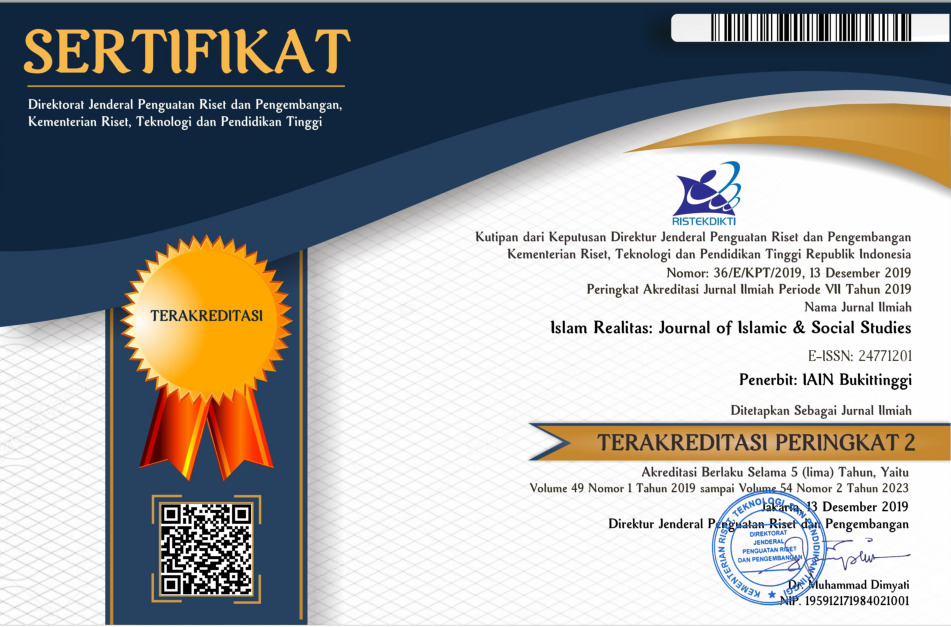Contesting Religious Family Rights: Muslim and Hindu Women’s Land Ownership in Java and Bali
Downloads
This article depicts issues of the connection between women’s status and their roles in landownership in Java and Bali. In Java, for example, despite the fact that they are fortified by family law, just around one-third of land ownership belongs to women. In Bali, the Hindu women need to comply with the standard law in which they deal with a dilemma between their privileges and their reliability towards their families, networks, and culture. The absence of women's land ownership, either by the customary law or by the land enrollment, shows that the agrarian approach of land enlistment consistently gets women into the lower status of their legal ownership. Additionally, it impacts on the manners in which they practice religious convictions as they are situated in troublesome way of any legal issues, including family law (hukum keluarga) and inheritance rights (hak waris). Not with standing the Javanese government's endeavors to teach the general population about land enrollment and a couple of Hindu families to move a component from parent to little girl through a deed of offer before the land deed official, a few women know about the registration phases and the religious instrument of legacy rights. Subsequently, the manners in which Java and Bali women' inclinations are not bargained in political, social, and religious aspects. This article concludes that formal methodology for the exchange of land ownership when land is sold or partitioned in Bali, and also, standard Javanese practices in which insurance to the possibility of marital goods is given.
Artikel ini berusaha menjelaskan hubungan antara status wanita dalam konteks agama dan peran mereka dalam kepemilikan tanah di Jawa dan Bali. Di Jawa, misalnya, meskipun kondisi mereka diperkuat oleh hukum keluarga, hanya sepertiga dari sertifikat tanah yang beratasnamakan perempuan. Sebaliknya, perempuan di Bali harus mengikuti hukum adat yang menghadapkan mereka pada dilema antara kebutuhan sehari-harinya di saatu sisi dan kepatuhannya terhadap keluarga, masyarakat, dan kebudayaan lokal di sisi lain. Minimnya kepemilikan tanah oleh perempuan ini, baik yang disebabkan oleh hukum adat maupun oleh hukum formal, memperlihatkan bahwa kebijakan pertanahan seringkali menempatkan mereka dalam status yang inferior. Mereka sama-sama menghadapi kesulitan di hadapan hak waris maupun hukum keluarga. Sekalipun di Jawa sudah ada sosialisasi terkait pendaftaran tanah dan di Bali sedikit dari mereka yang memberikan hak kepemilikannya kepada anak perempuannya, mereka tetap saja masih belum banyak memahami prosedur registrasi tersebut dan semakin marjinal dalam kepemilikan tanah dari hak waris. Kondisi ini memperlihatkan bagaimana perempuan Jawa dan Bali tidak terlalu diperhitungkan dalam ranah kebudayaan, politik, dan agama. Artikel ini akhirnya berkesimpulan bahwa perlu ada prosedur penjaminan tanah ketika tanah itu dibagikan di Bali, dan perlu ada jaminan keamanan terhadap hak-hak waris dalam adat Jawa
Journals
Agarwal, Bina, ‘Gender and Land Rights Revisited: Exploring New Prospects via The State, Family and Market’, Journal of Agrarian Change, 3.1â€2 (2003), 184-224.
Astawa, Ida Bagus, Soegeng Waloeyo, and John E. Laing, ‘Family planning in Bali’, Studies in Family Planning, 6(4) (1975), 86-101.
Astiti, Tjokorda Istri Putra, Anak Agung Istri Ari Atu Dewi, and Michael Faure, ‘Tourism Development and Customary Land Law in Bali: the Case of the Tenganan Pagringsingan Village’, Sw. J. Int'l L. 20.1 (2013), 119.
Brown, Jennifer, and Firliana Purwanti, ‘Registration of Land and Women’s Land Rights on Java’, Seattle: Rural Development Institute, 21.1 (2000), 32.
Brown, Jennifer, ‘Rural Women’s Land Rights in Java’, Pacific Rim Law & Polic y Journal, 12. 3 (2003), 631.
Bums, Anthony, ‘Land Registration to Improve Security, Transparency, Governance & Sustainable Resource Management’, reprinted in Comparative Study of Land Administration Systemsindonesia Case Study, 4.22 (2000), 20.
Cammack, Mark, ‘Islam, Nationalism, and The State in Suharto's Indonesia, Wis. Int'l LJ 17.1 (1999), 27.
Cukier, Judie, Joanne Norris, and Geoffrey Wall, ‘The Involvement of Women in The Tourism Industry of Bali, Indonesia’, The Journal of Development Studies, 33.2 (1996), 248-270.
Dewi, Anak Agung Istri Ari Atu, ‘Potensi Hukum Adat: Peran Majelis Desa Pakraman (MDP) Bali dalam Pembangunan Hukum Nasional’, Kertha Patrika, 38.3 (2016), 32-45.
Elmhirst, Rebecca, et al., ‘Gender and Generation in Engagements with Oil Palm in East Kalimantan, Indonesia: Insights from Feminist Political Ecology’, The Journal of Peasant Studies, 44.6 (2017), 1135-1157.
Fagertun, Anette, ‘Labour in Paradise: Gender, Class and Social Mobility in The Informal Tourism Economy of Urban Bali, Indonesia’, The Journal of Development Studies, 53.3 (2017), 331-345.
Fawaid, Achmad, ‘Menuju Etika Pendidikan Kesetaraan: Membendung Bias Gender, Mencari Perspektif Humanis’, Musãwa Jurnal Studi Gender dan Islam, 6.1 (2008), 57-80.
Floro, Maria Sagrario, and Ranjula Bali Swain, ‘Food Security, Gender, and Occupational Choice Among Urban Low-Income Households’, World Development, 42 (2013), 89-99.
Incing, Veronika, Willy Tri Hardiyanto, and Sugeng Rusmiwari, ‘Kesenjangan Gender (Perempuan) dalam Mendapatkan Pendidikan pada Masyarakat Pedesaan’, JISIP: Jurnal Ilmu Sosial dan Ilmu Politik, 2.1 (2015), 56-67.
Jha, Nitish, ‘Gender and decision making in Balinese agriculture’, American Ethnologist 31.4 (2004), 552-572.
Kieran, Caitlin, et al., ‘Examining Gender Inequalities in Land Rights Indicators in Asia’, Agricultural Economics, 46.S1 (2015), 119-138.
Lucas, Anton, ‘Land Disputes in Indonesia: Some Current Perspectives’, Indonesia, 53. 2 (1992), 79-92.
Malhotra, Anju, ‘Gender and Changing Generational Relations: Spouse Choice in Indonesia’, Demography, 28.4 (1991), 549-570.
Malhotra, Anju, ‘Gender and The Timing of Marriage: Rural-Urban Differences in Java’, Journal of Marriage and the Family, 32.1 (1997), 434-450.
Muhamad, Dendi, et al., ‘Living Close to Forests Enhances People׳s Perception of Ecosystem Services in a Forest–Agricultural Landscape of West Java, Indonesia’, Ecosystem Services, 8 (2014), 197-206.
Ndun, Hanna Christine, Sarah Suttor, and I. Gusti Agung Ayu Dike Widhiyaastuti, ‘Does Customary Law Discriminate Balinese Women’s Inheritance Rights?’ Udayana Journal of Law and Culture, 2.1 (2018), 97-114.
Puspitawati, Herien, Paula Faulkner, and Tin Herawati, ‘Gender Relations And Subjective Family Well-Being Among Farmer Families: a Comparative Study Between Uplands and Lowlands Areas in West Java Province, Indonesia’, Journal of Family Sciences, 3.1 (2018), 53-72.
Silvey, Rachel, ‘Gender Geographies of Activism: Motherhood, Migration, and Labour Protest in West Java, Indonesia’, Asian Journal of Social Science, 31.2 (2003), 340-363.
Stoler, Ann, ‘Class Structure and Female Autonomy in Rural Java’, Signs: Journal of Women in Culture and Society, 3.1 (1977), 74-89.
Tajeddini, Kayhan, Alf H. Walle, and Mela Denisa, ‘Enterprising Women, Tourism, and Development: The Case of Bali’ International Journal of Hospitality & Tourism Administration, 18.2 (2017), 195-218.
Villamor, G. B., et al., ‘Land Use Change and Shifts in Gender Roles in Central Sumatra, Indonesia’ International Forestry Review,17.4 (2015), 61-75.
Westendorp, Ingrid, ‘Personal Status Law and Women's Right to Equality in Law and in Practice: The Case of Land Rights of Balinese Hindu Women’, Journal of Human Rights Practice, 7.3 (2015), 430-450.
White, Ben, ‘Agroindustry and Contract Farmers in Upland West Java’, The Journal of Peasant Studies, 24.3 (1997), 100-136.
Books and Reports
Burns, Anthony, ‘Land Registration to Improve Security, Transparency, Governance & Sustainable Resource Management. Comparative Study of Land Administration Systems’, World Bank Asia Regional Workshop on Land Policy and Administration working paper, (World Bank, Washington, DC. 2002).
Charlesworth, Hilary, Sam Chaiton, and C. M. Chinkin, The Boundaries of International Law: A Feminist Analysis (UK: Manchester University Press, 2000).
Covarrubias, Miguel. Island of Bali (New York: Tuttle Publishing, 2015).
Departement of Religious Affairs, The Compilation of Islamic Law in Indonesia (Jakarta: Kemenag, 1997).
Kambel, Ellen-Rose, ‘Are Indigenous Rights for Women Too? Gender Equality and Indigenous Rights in the Americas: The Case of Surinam’, in T. Loenen en P. Rodrigues (red.), Non-Discrimination Law: Comparative Perspectives (The Hague: Kluwer Law International, 1999).
Lucas, Anton, and Carol Warren. Land for The People: The State and Agrarian Conflict in Indonesia (New York: Ohio University Press, 2013).
Long, Veronica H., and Sara L. Kindon, ‘Gender and Tourism Development in Balinese Villages’, in Gender, Work and Tourism (UK: Routledge, 2005)
Muhidin, Salahudin, "The Population of Indonesia: Regional Demographic Scenarios Using a Multiregional Method and Multiple Data Sources." Ch 2 (2006), 400-402. (Population Studies Series).
Rao, Nitya, "Women’s Access to Land: An Asian Perspective." Expert Paper prepared for the UN Group Meeting ‘Enabling Rural Women’s Economic Empowerment: Institutions, Opportunities and Participation’. Accra, Ghana. 2011.
Sirait, M. T., White, B., & Pradhan, U., ‘Land Rights and Land Reform Issues for Effective Natural Resources Management in Indonesia’ (pp. 141-155). In Redefining Diversity & Dynamics of Natural Resources Management in Asia, Volume 1 (UK: Elsevier, 2017).
UN Committee on Economic, “Social, and Cultural Rights (CESCR)â€. Combined Sixth and Seventh Periodic Reports of Indonesia, CEDAW/C/IDN/6–7, 2011.
Wanyeki, Lynne Muthoni, ed., Women and Land in Africa: Culture, Religion and Realizing Women's Rights (Cape Town: New Africa Books, 2003).
Williams, L. B., Development, Demography, and Family Decision-Making: The Status of Women in Rural Java (New York: Routledge, 2019).
Windia, Wayan P. Danda Pacamil, Catatan Populer Istilah Hukum Adat Bali (Denpasar: Upada Sastra, 2004).
World Conference of the United Nations Decade for Women, and United Nations, Report of the World Conference of the United Nations Decade for Women: Equality, Development and Peace; Copenhagen, 14 to 30 July 1980.
World Conference of the United Nations Decade for Women, and United Nations, “Economic and Social Commission for Asia and The Pacific, Women in Indonesia: A Country Profile 10â€, U.N. Doc. ST/ESCAP/1767 (1998).
Zoomers, Annelies, and Gemma van der Haar, Current Land Policy in Latin America: Regulating Land Tenure Under Neo-Liberalism (UK: Royal Tropical Institute, KIT Publishers, 2000).
Interview
NN (BPN Official), Interview {Friday, 14 Agustust 2017}
NN (NGO Representative in Bali), Interview {Saturday, 22 July 2017}
NN (PPAT Official), Interview {Saturday, 13 May 2017}
NN (Rural Farmers), Interview {Thuesday, 22 June 2017}
NN (Rural Farmers), Interview {Friday, 23 June 2017}
NN (Divorcee), Interview {Thuesday, 20 July 2017}
NN (Legal Office of Bali), Interview {Saturday, 22 July 2017}
NN (Two Widows), Interview {Thursday, 20 July 2017)
NN (Representatives of Komunitas untuk Indonesia yang Adil dan Setara (Indonesian Society for Honesty and Equality, KIAS) and the Indonesian Legal Aid Foundation (ILAF)), Interviews { Friday, 21 July 2017).
Authors who publish with this journal agree to the following terms:
- Authors retain copyright and grant the journal right of first publication with the work simultaneously licensed under a Creative Commons Attribution License that allows others to share the work with an acknowledgment of the work's authorship and initial publication in this journal.
- Authors are able to enter into separate, additional contractual arrangements for the non-exclusive distribution of the journal's published version of the work (e.g., post it to an institutional repository or publish it in a book), with an acknowledgment of its initial publication in this journal.
- Authors are permitted and encouraged to post their work online (e.g., in institutional repositories or on their website) prior to and during the submission process, as it can lead to productive exchanges, as well as earlier and greater citation of published work (See The Effect of Open Access).









